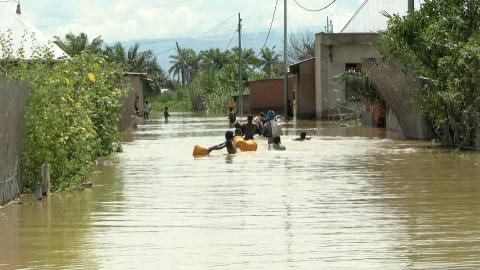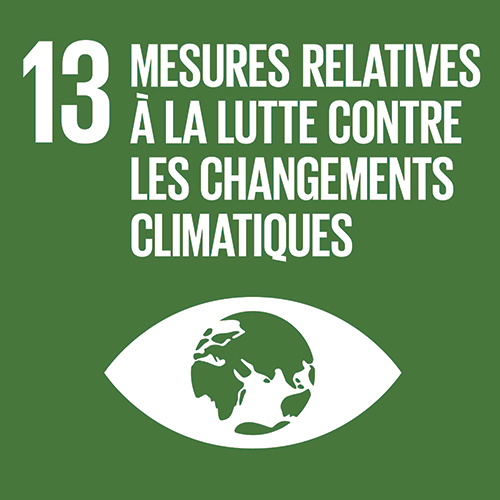Third and final interview on Policy Supporting Programmes (PSPs). Today, we focus on the PSP Climate & Environment, based a social science approach to questions at the instersection of sustainable development, climate change and ecology, in order to contribute to better informed development policymaking and interventions.
Leonard K. Mubalama is professor in the environmental sciences at the Higher Institute of Rural development (ISDR-Bukavu) and congolese partner of this PSP. In this interview, he talks about the contribution of his institution, to this inter-institutional and international programme, which aims to produce actionable knowledge to support strategic and operational policymaking processes focusing on the nexus between development, the environment and climate change. The approach is rooted in the recognition that climate change, environmental distress and food security are not just scientific or technical problems, but social, political and economic challenges. This programme also draws on the expertise of UMONS, UGENT, KUL and UJKZ (Burkina Faso)
As a partner, what is your contribution to the various components and activities of this project?
Leonard K. Mubalama : As a partner from the South (ISDR Bukavu), our contribution to the various components and activities of the PSP Climate & Environment project supported by the DGD (Direction Générale de la Coopération au Développement) in Belgium can be articulated across multiple strategic levels. These contributions are both academic and operational, ensuring relevance, ownership, and sustainability of the project outcomes in the context of the Global South. Here are some examples:
- Contribution to research components, contribution to capacity building, training and mentorship,
strengthening Local Institutional Capacities - Contribution to Outreach and Policy Engagement: dissemination of results in local arenas, influence on territorial and environmental planning:
- Operational and logistical support : facilitating field access and security, liaison with local stakeholders
In your opinion, what is the value of involving local expertise, in this case that of the Higher Institute for Rural Development, in such a project?
Leonard K. Mubalama : Involving local expertise—such as that of the Higher Institute for Rural Development (ISDR Bukavu)—in a project like the PSP Climate & Environment is not only valuable but essential for ensuring the relevance, legitimacy, and long-term impact of the initiative. This value can be articulated across the following key dimensions:
- Contextual Relevance and Grounded Knowledge : ISDR brings deep contextual understanding of the socio-ecological, cultural, and institutional landscapes of the Congo Basin, particularly in eastern DRC. This localized expertise ensures that research questions, methodologies, and interventions are adapted to the realities on the ground and not simply imported from the Global North.
- Co-Production of Knowledge and Epistemic Equity: Involving ISDR affirms the principle of knowledge co-production, where Southern institutions are not merely data providers but equal intellectual partners in defining, analyzing, and translating research. This fosters epistemic justice by valuing indigenous and community knowledge systems alongside academic ones.
- Capacity Building and Sustainability: The engagement of ISDR ensures that capacity development is embedded locally, strengthening the institutional and human resource base for environmental governance and climate research in the South. It also creates lasting structures for research continuity beyond the lifespan of the project.
- Legitimacy and Trust with Local Communities: ISDR’s longstanding presence and credibility among rural populations, Indigenous Peoples, and local authorities positions it as a trusted interlocutor. This legitimacy is crucial for participatory research, conflict-sensitive interventions, and the successful implementation of climate and conservation initiatives.
- Strategic Influence on Policy and Territorial Planning: ISDR is actively involved in local and provincial dialogues on land use, forest governance, and rural development. Its participation ensures that project outcomes inform and influence public policies in ways that are aligned with both community needs and national priorities.
Concerning your work at the ISDR, what are the potential benefits of this project for your institution?
Leonard K. Mubalama : Potential benefits of the PSP Climate & Environment Project for ISDR and its biodiversity management and climate change research centre (CRGBC) are numerous:
- Strengthening of Institutional Research Capacity
- Access to Collaborative Research Networks: Through its integration into the PSP, ISDR becomes part of a transnational research consortium involving top Belgian universities (UCLouvain, KU Leuven, Ghent University, UMons). This exposure enhances the visibility and scientific credibility of ISDR’s research center.
- Technical and Methodological Upgrading: The project provides opportunities for ISDR researchers to be trained in cutting-edge research methodologies related to ecosystem monitoring, climate vulnerability assessments, and environmental modeling, increasing the scientific rigor of local studies.
- Enhancement of Academic Programs and Student Training
- Field-Based Learning and Thesis Supervision: Students affiliated with ISDR, especially from the environmental management and rural development programs, will benefit from fieldwork opportunities and co-supervised thesis work, increasing the quality of graduate training.
- Curriculum Enrichment Project outputs (datasets, case studies, tools) can be integrated into teaching materials, especially within courses on climate adaptation, biodiversity, and sustainable development.
- Resource Mobilization and Infrastructure Development
- Laboratory and Field Equipment: The PSP project may bring logistical support and scientific equipment to the Biodiversity Centre (e.g., GPS units, software licenses, remote sensing tools), improving its technical capabilities.
- Improved Research Facilities: Access to funding under the PSP allows for the upgrading of offices, internet connectivity, and data management systems at ISDR's Centre, fostering a more professional research environment.
- Knowledge Valorization and Policy Engagement
- Influence on Territorial and Environmental Policy: Through its involvement, the ISDR Biodiversity Centre strengthens its role as a local think tank that can influence environmental policy, land-use planning, and biodiversity conservation strategies in the South Kivu region.
- Production of Locally Relevant Knowledge :The centre contributes to the generation of evidence that directly addresses local environmental challenges, thus aligning research outputs with provincial and national development priorities.
- Institutional Visibility and Strategic Partnerships
- Recognition as a National and Regional Actor: The PSP project elevates ISDR's standing among Congolese academic institutions and within regional networks focused on the Congo Basin, facilitating future partnerships with NGOs, state agencies, and international donors.
- Leveraging for Future Projects: The project serves as a launching pad for ISDR to seek additional research and development funding by showcasing successful collaboration with Northern institutions.
In concrete terms, what will be the contribution of the various international (i.e. non-Belgian) partners in this programme?
Leonard K. Mubalama : The PSP Climate & Environment project embraces a multi-actor and multi-scalar approach that relies not only on Belgian institutions but also on strategic international (non-Belgian) partners, particularly those from the Global South, like universities, research centers, NGOs, and regional institutions. Their concrete contributions include:
- Co-Creation of Research Agendas and Knowledge Production
- Contextualization of Research: International partners, such as universities and research institutes in Africa ensure that the research questions, field protocols, and case studies are grounded in the ecological, cultural, and socio-political realities of their regions.
- Local Field Research and Data Collection: They provide access to research sites, mobilize local researchers and students, and facilitate the collection of both scientific and community-based data. This ensures the diversity of case studies across tropical and sub-tropical contexts.
- Capacity Building and Academic Exchange
- Training and Supervision: Non-Belgian partners co-organize capacity-building sessions, supervise students (joint degrees, co-publications), and participate in academic exchanges. They contribute to reinforcing higher education in their countries through South-South and South-North learning.
- Hosting of Internships and Research Visits: They welcome Belgian and other international students and researchers, facilitating immersion in diverse environmental contexts (e.g., deforestation in the Amazon, mangrove degradation in Southeast Asia, or biodiversity loss in the Congo Basin).
- Policy and Community Interface
- Engagement with Local Stakeholders: These partners often have strong ties with local governments, customary authorities, and civil society. They can play a key role in the dissemination and translation of research outcomes into community-led action and policy influence.
- Piloting of Innovative Practices: They may contribute in implementing and testing practical climate adaptation and biodiversity conservation initiatives (e.g., agroecology, forest co-management, climate risk mapping), serving as living laboratories for the project.
- Diversifying Perspectives and Ensuring Equity
- Representation of Southern Epistemologies: Non-Belgian partners ensure that local and indigenous knowledge systems are integrated into the academic outputs of the programme, promoting epistemic justice and decolonial perspectives in environmental research.
- Balancing Power Relations in Science: Their involvement is crucial for moving away from extractive models of research, toward co-leadership and co-authorship in publications, project design, and funding mobilization.
PSPs are designed to provide advice and answers to political actors, mainly in Belgium. How can this advice be extended to other political spheres, such as the DRC or other countries?
Leonard K. Mubalama : Extending the advice and insights generated by PSP—initially designed to inform Belgian political actors—to other political spheres like the DRC or similar countries requires both strategic adaptation and partnership. Here are concrete strategies and approaches for doing so:
1. Bilateral and multilateral cooperation: use existing partnerships (e.g. Enabel, DGD, EU) to integrate PSP research into joint policy dialogues, particularly on topics such as climate resilience.
2. Translation and contextualisation of policies: adapt PSP recommendations to local political, social and cultural realities through accessible documents, in collaboration with national ministries (e.g. Environment, Gender, Education).
3. Regional and continental engagement: mobilise African regional bodies (e.g. AU, SADC, COMIFAC) to disseminate PSP recommendations on a larger scale.
4. Support for think tanks and universities: work with local institutions (e.g. ISDR-Bukavu, UNIKIN) to co-produce and contextualise knowledge.
5. Capacity building: integrate PSP results into training for local administrations, NGOs, and technical actors, supported by international donors (e.g., World Bank, FAO).
6. South-South learning: organise exchanges between the DRC and other African countries facing similar challenges, promoting PSP approaches.
7. Operational tools: transform PSP advice into concrete tools (e.g. dashboards, decision-making frameworks) adapted to fragile contexts.
For DRC, can you give an example of implementation?
We can consider that the problem is the link between climate change and local conflicts (e.g. South Kivu). The PSP solution could Integrate inclusive governance, adaptive resource management and monitoring tools (e.g. vulnerability assessments, valuation of ecosystem services).
A two-way value chain could consider that the expansion of PSP is not simply a matter of exporting, but a process of: translation and localisation, policy co-creation and mutual learning. This strengthens the coherence of Belgian policies while supporting the resilience and sovereignty of partner countries such as the DRC.
So at the end of this interview, what is your conclusion ?
Leonard K. Mubalama : By embedding transnational policy engagement mechanisms, the PSP Climate & Environment can extend its strategic advisory role from Belgian institutions to the national and regional governance frameworks of Southern partner countries. This enhances mutual benefit, promotes policy coherence, and aligns academic collaboration with the realities and aspirations of the Global South in the face of climate and environmental challenges. Overall, the added value for Belgian cooperation can be translated into the following:
- Increased policy coherence across development, climate, and diplomacy;
- Strengthens Belgium’s role in the EU Global Gateway and Team Europe approach and
- Supports transformative partnerships based on equity, knowledge exchange, and sustainability.
Find out more
- Discover the CLEAR programme website
Photo : IWACU


